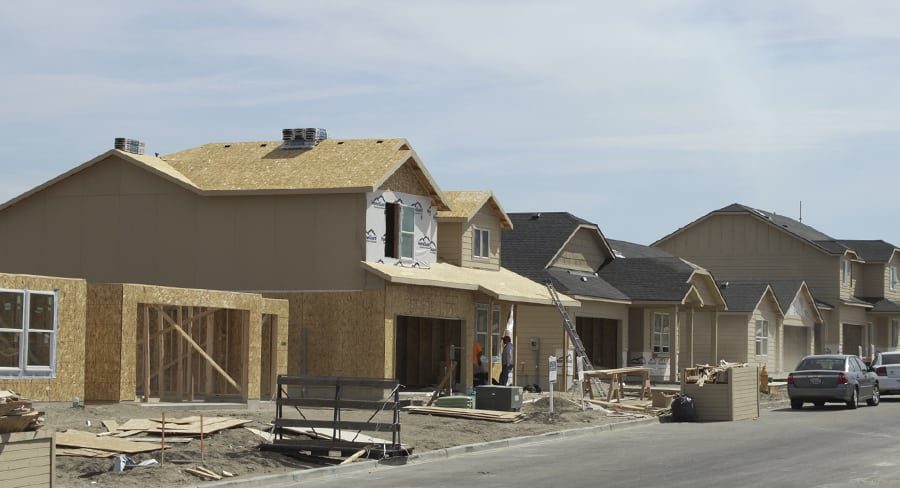
Home » Builders face rising home permit fees
Builders face rising home permit fees

September 13, 2018
Tri-City home building permits remain a fraction of the cost they are in larger cities like Seattle and Portland, but the final price tag still has seen steady increases in recent years across Pasco, Kennewick and now Richland.
“My counterparts in other regions would probably laugh at our fees. In the Portland market, the fees can be upwards of $50,000 for a (single-home) permit,” said Jason Spence, Pahlisch Homes’ vice president of Central Washington. “But we’re all on a neutral field locally between our competitors and homeowners.”
The field is less neutral based on the city where a home is being built, as fees range widely from one to another.
The highest price tag is for homes built within Pasco city limits, where a permit for a single-family home valued at $250,000 would total $8,669. The lion’s share of the fee comes from the estimated impact to schools in the Pasco School District.
The city of Pasco began collecting school impact fees in spring 2012 after nearly two years of discussion on how to roll out the process.
“It’s a direct cost to our jobs that is passed through to our customer,” said Spence, whose Bend, Oregon-based company has been building homes in mostly Richland and Pasco for the past decade. “There’s a national push for affordable housing, so all those fees affect affordable housing.”
Tri-City builders and real estate groups don’t support any increased building costs.
“The Tri-Cities Home Builders Association is opposed to anything that’s going to drive up the cost of housing even more. The Growth Management Act is intended to promote affordable housing but it does the opposite of that because it restricts the supply of land and allows these impact fees. We would like to see these decisions made locally and not by the governor’s appointees,” said Jeff Losey, executive director of the Home Builders Association of Tri-Cities.
“We are opposed to impact fees or anything that can restrict or dampen development,” said CEO Lola Franklin of the Tri-City Association of Realtors.
Pasco determined the impact fees were needed since school district enrollment had outpaced the ability to continue housing and educating students. The fees were allowed under the Growth Management Act, state subdivision laws and the State Environmental Policy Act.
By law, the district can only use money from impact fees for costs related to enrollment growth. For example, impact fees can be used to buy land for new schools or add new classrooms to existing buildings.
A cost of $4,683 was added to each home permit issued to build a single-family home in Pasco. The plan was initially met with an outcry from local builders, but in the six years since, the added expense has not slowed the pace of new construction within Pasco.
“In Pasco, permits are double the cost, and I would hope it would be backwards of that because of what we can we get in a Pasco neighborhood versus what we can get in a Richland neighborhood,” Spence said. “The going rate for a Richland home is just more, the median price is higher.”
Today, the home permit fee in Pasco is determined based on an initial scale for the value of the home. From there, the 2018 fee schedule includes a $4,700 school impact fee, $1,425 parks fee and $709 traffic impact fee.
Since the school impact fee was first introduced in Pasco, the city reports it collected more than $8 million between 2012-17. The district presents biannual updates to the city in the form of a capital facilities plan to maintain its eligibility to receive school impact fees. The plan includes specifics on factors like the district’s standard of service, an inventory of its facilities and an enrollment forecast covering six years.
The city uses this report to make fee adjustments, if necessary, which has led to a slight fee increase since it was initially rolled out. The district also makes yearly reports to the city of Pasco how the money was spent.
Franklin County did not authorize the district to collect fees built for homes in unincorporated areas that lie outside Pasco’s city limits, but still within the boundaries of the school district.
“The district has attempted to collect those impact fees from the developers, but has been unsuccessful in most instances,” said Shane Edinger, spokesman for the Pasco School District.
The district estimates it lost $1.1 million in potential impact fees because of this, but recently found a new way to enforce the impact fee under the state Environmental Policy Act, without the need for approval from Franklin County commissioners. Now, when a new development is submitted to Franklin County’s planning department, the district has the ability to identify environmental impacts from the project and work with the developer to mitigate these. Under this new enforcement, the district said it has collected $47,000 in mitigation fees since May for homes built in unincorporated Franklin County.
Kennewick recently revised its transportation impact fees, or TIFs, collected on home building permits to a location-based cost, splitting the city into four separate districts.
City officials say the fees are used to pay for transportation projects needed as a result of increased growth in the city.
The city determined it was more equitable to shift the costs from the community at large, to those directly impacting the traffic. Kennewick’s TIF rolled out in September 2015 and was revised in June. It created Traffic Impact Fee Districts instead. The Kennewick Municipal Code says the intent of a traffic impact fee, “is to ensure that adequate facilities are available to serve new growth and that the new growth pays a proportionate share of the cost of the infrastructure needed to support that growth.”
In determining the fee, Kennewick calculates the TIF based on each vehicle trip likely to happen during the peak p.m. hour, determined by the use and location of the property, as well as traffic data from the Institute of Transportation Engineers.
The city split Kennewick into four districts, including Southridge, the Vista Field area and downtown. The fourth district, also the largest, encompasses all other areas of the city. Currently, the heaviest growth from new construction in Kennewick is occurring in the Southridge area, which is why the highest fee, $1,324, was assessed for each single-family home building permit issued.
Comparably, a fee of $850 will be charged for single-family units planned at Vista Field, and $982 for all other areas in Kennewick, not including downtown.
Expecting the least impact to infrastructure, a TIF in downtown Kennewick is $337. Kennewick said its TIF rate is about average for the Tri-Cities and about one-third the national average. The city’s base rate for a building permit has not changed in the last five years.
As with other cities, Kennewick’s building permit fee includes a cost to maintain and operate the city’s parks. A permit of a single-family unit east of Highway 395 costs $760 and a unit west of the highway costs $920. To calculate the cost of a $250,000 home, the permit fee would vary widely based on the location of the home due to the TIF and the park fee. It could range from $2,936 for a home built in the downtown core, to $4,083 for a home built in Southridge.
Taking a page from Kennewick, Richland is also re-examining the costs connected to the impact of traffic created from new home construction, calling them “road impact fees” instead.
Richland adopted its road impact fees in fall 2004, but has been recently working to revise the fees and include the area known as Badger Mountain South, near Dallas Road and Interstate 182. The Richland Municipal Code said these fees should be based on “a showing that new development creates additional demand and need for public streets and roads,” and not that they “make up for deficiencies in public streets and roads serving existing developments.”
Richland also uses a location-based fee schedule for its road impact fees. Previously, Richland had just two zones in the city that were levied a fee, focused only on south Richland, and basically split the map into areas east or west of Queensgate Drive. A new third district, effective Aug. 1, covers Badger Mountain South. Also effective Aug. 1, Richland raised fees for construction east of Queensgate, from $1,533 to $1,991, and west of Queensgate from $474 to $854. The newly-formed third district sees the highest fees, at $2,229.
Once again estimating the permit cost for a $250,000 home, this could range from $2,694 to $4,069 in Richland, depending on the location of the home. Other fees attached to the permit including a right-of-way fee, sewer and water assessments, and a water meter are not included. Richland’s park fee is paid on the subdivision level when a lot is platted by a developer and not when the home permit is issued.
Fees may be paid by the developer or the builder, but they’re generally all passed on to the buyer of the new home, which may be a source of contention when the buyer isn’t the only one benefitting from the infrastructure improvements.
“This has always been a long-term debate amongst builders because most times they say, ‘You’re building new homes, therefore you’re causing other systems to break,’ when in reality, it’s like, ‘Is that true? Or is it everybody’s fault?’ We may be pushing it to the next level but are we responsible for all of the improvements to widen this intersection? Or should it come from property taxes where everyone shares in the cost?” Spence said.
Local News
KEYWORDS september 2018





